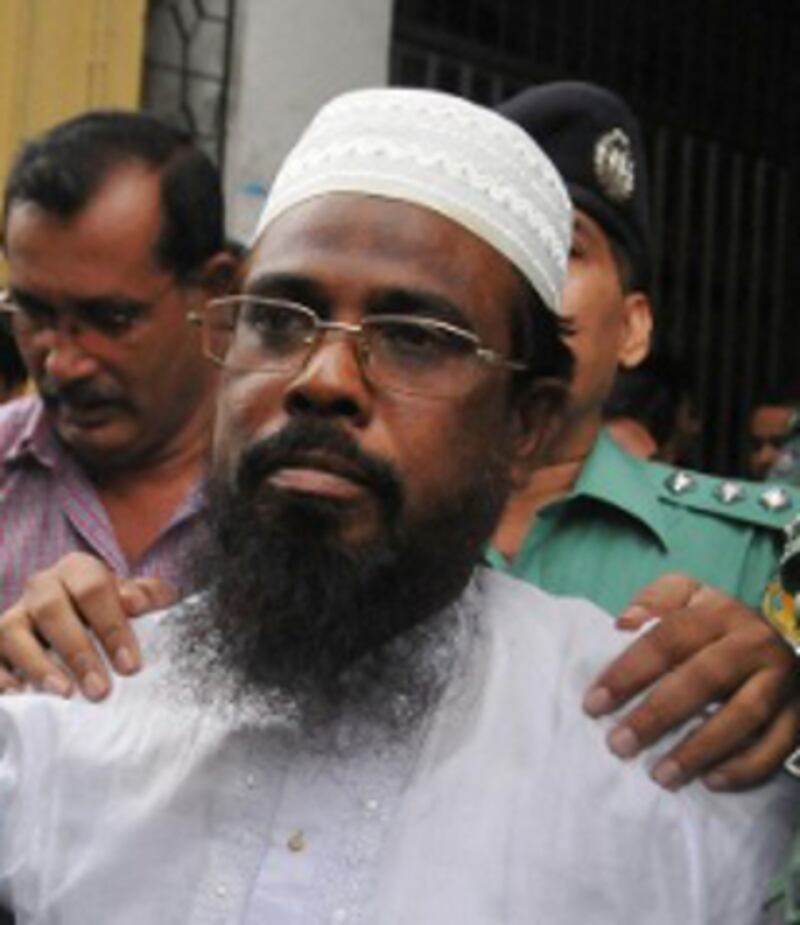Bangladeshi authorities late Wednesday executed the leader of the Harkat-ul-Jihad al-Islami (HuJI) militant group and two associates for the deaths of three people during a failed assassination attempt on the British ambassador 13 years ago.
HuJI chief Mufti Abdul Hannan and two of his aides, Sharif Shahedul Alam (alias Bipul) and Delwar Hossain (alias Ripon), were put to death simultaneously at jails in the Dhaka and Sylhet areas, officials confirmed.
“At 10 p.m. today, Mufti Hannan and Bipul were executed at the Kashimpur jail. Ripon was also hanged at the Sylhet jail at the same time,” Inspector General of Police A.K.M. Shahidul Hoque told BenarNews.
Hoque said the bodies of the three hanged militants would be turned over to family members for burial.
Kashimpur is on the outskirts of Dhaka and the Sylhet jail, in northeastern Bangladesh, is a short distance from where the attack on British High Commissioner Anwar Choudhury occurred on May 21, 2004.
The hangings of Hannan and his two aides could close a dark chapter on HuJI, a militant outfit which, in 1999, initiated an era of violent extremism in Bangladesh, rights groups said.
The executions moved swiftly after the defendants’ clemency appeals to the president were denied on Tuesday. Authorities beefed up security measures early Wednesday, closing the road leading to the Kashimpur jail and surrounding roads.
Hannan is the first top-ranking militant leader to be executed since 2007 when authorities hanged Jamaat-ul Mujahideen Bangladesh (JMB) founder Shaikh Abdur Rahman and his military wing chief, Siddiqul Islam, for terrorism and militancy.
Since the Awami League-led government established a war-crimes tribunal known as the International Criminal Court six years ago, Bangladesh has executed at least six opposition leaders for crimes committed during the 1971 war of independence from Pakistan.
Mohammad Moniruzzaman, assistant inspector general of police, said Hannan’s execution had special significance.
“Bangladesh as a state has tried a notorious militant and this is a message to militants. At the same time, this also proves that law enforcement agencies have been working to help establish rule of law in the country,” he told BenarNews.
Family visits
At around 7 a.m. Wednesday, four of Hannan’s family members visited him at the Kashimpur jail, senior superintendent Mizanur Rahman told BenarNews. Such visits usually occur when executions are imminent.
Hannan’s wife, Zakia Parvin, two daughters, Nishi Khanam and Nazrin Khanam, and elder brother, Aliuzzaman Munshi, stayed with him for about 50 minutes. Two brothers who themselves are in jail, Md Mohibullah and Md Anis, were allowed to visit with him as well.
Meanwhile, Sylhet jail authorities informed Ripon that the president had turned down his clemency appeal and allowed his father, Abu Yusuf, mother, Azizunnesa, and other family members to visit him on Tuesday.
Court actions
In February 2016, the High Court division of Bangladesh’s Supreme Court upheld the 2008 convictions and death sentences for the trio, who had tried to kill High Commissioner Choudhury in May 2004. Choudhury survived the grenade attack that killed three others.
In December 2016, the militants’ appeal of the verdict to the court’s appellate division failed as a four-judge panel upheld their death penalties.
Last month, when the appellate court rejected their petition to review their death sentences, the defendants sought presidential clemency in a last-ditch effort to avoid the gallows.

Mufti Abdul Hannan [AFP]
Hannan’s rise
Hannan, who fought against Soviet troops in Afghanistan in the 1980s and learned to make bombs, formed HuJI in 1994. He and his group attempted to assassinate Prime Minister Sheikh Hasina three times, beginning in 2000.
In 2001, HuJI carried out an attack in Dhaka. A year earlier, Hannan allegedly planned to kill Hasina by planting a bomb at the helipad where her helicopter was to land.
Three months after the attack targeting Choudhury – now Britain’s ambassador to Peru – HuJI was blamed for a grenade attack in Dhaka on an anti-terrorism rally by the Awami League, which at that time was the opposition party led by Hasina. She was injured in the attack that killed at least 22 people on Aug. 21, 2004.
Opposition, support for execution
The British High Commission and global rights group Human Rights Watch opposed the executions.
Bangladesh groups, on the other hand, said the executions could bring an end to HuJI and its violence.
“HuJI is responsible for most of the militant attacks since Bangladesh’s independence. Mufti Hannan led 13 such attacks, killing over 100 people and injuring scores,” Nur Khan Liton, executive director of Bangladesh human rights group Ain-o-Salish Kendra, told BenarNews.
“The chapter of HuJI, which started the militant activities through bombing the Udichi cultural program in Jessore, may end with this execution,” he said.
Jamshed Anwar, secretary of the cultural group Udichi, said Hannan was the mastermind of the 1999 Jessore bombing.
“This is a matter of relief for those killed in the Udichi attack and their family members,” he said.
“The HuJI may be neutralized. But my fear is other militant outfits would continue their militant activities under different brands,” he said.
Kamran Reza Chowdhury in Dhaka contributed to this report.
